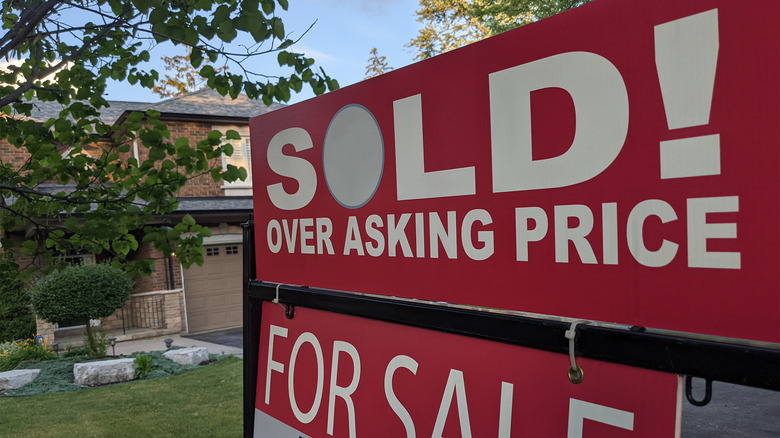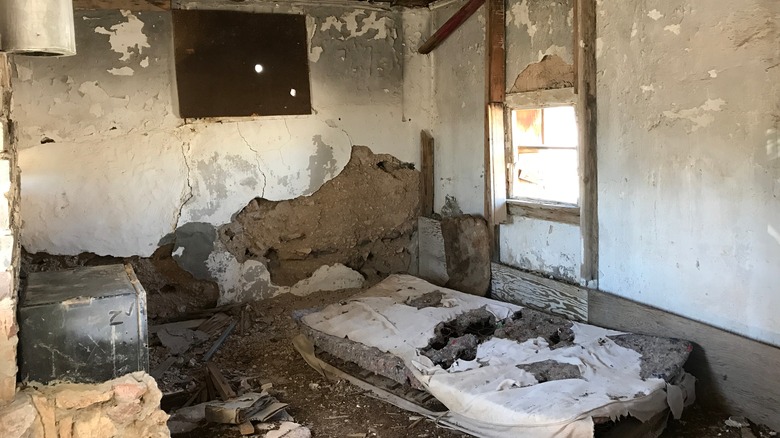Realtors Can Land In Jail For These Shady Practices
When it comes to buying or selling real estate, your due diligence doesn't end at selecting the appropriate party to represent your interests. Unfortunately, property-related fraud should be on a list of scams to watch out for in 2024, and the people you trust most to guide you through the whole process are sometimes who you have to keep the closest eye on.
A public service announcement courtesy of the Federal Bureau of Investigation (FBI) revealed a 27% rise in real estate scam reports between 2020 and 2022, alongside a 27% increase in financial losses related to fraud. This represented $441.1 million in financial losses in the real estate sector. A 2024 State of Wire Fraud study conducted by wire fraud protection company CertifID mentions the number of people who could be involved in a standard real estate transaction — as many as 10 individuals — alongside low inventory in 2023 motivating everyone involved to close quickly, and more sophisticated forms of fraud involving AI and identity theft as catalysts for shady real estate deals. Although 51% of clients believe they weren't properly informed of wire fraud risks, 71% of clients believe someone else should be responsible for advising them about it. Legally, real estate professionals who fail to do right by their clients can be sued for negligence, and in instances where they have direct involvement, imprisoned. Here's how.
Transferring home ownership using stolen or fraudulent identities
While there are a number of popular myths about buying a house in 2024, stories about people losing ownership of their home due to fraud isn't one of them. Title or Deed theft is very real, and it occurs when a scam artist uses forged documentation based on a fraudulent or stolen identity to transfer ownership of the property to themselves. The profit comes after the same documentation and identity is used to offload the home through a Realtor to an unsuspecting third party, who also stands to lose their deposit. Homes where the owners aren't usually present — vacation homes or rental properties, for instance — make the best targets since personal information provided by mail is readily available, with social media, phishing, or the dark web giving them the rest.
A scammer in Fort Lauderdale, Florida created a fake identity and became the executor on a $1 million estate. The scammer, Tyrone Jones, rented the house to eight other adults and a child, who were all removed from the property by police after the fraud was discovered. Jones was also trying to gain ownership of 14 homes in the area at the time of his arrest. A four-hour drive away in Tampa, Florida, real estate Broker Michael Bogsted was given 60 months probation and a court ordered $177,000 settlement to victims of his title theft scheme, where he used a fake identity to transfer ownership and sell homes to unaware buyers.
Selling a home using a stolen identity
The other side of the coin is selling a home with a stolen identity. This happens when one party either makes statements they know to be untrue about the property — including that they don't actually own the home they're selling. In Laconia, New Hampshire, local real estate agents were inundated with suspicious calls from home sellers looking to sell their homes through quick cash transactions. One agent, Tracy Jenkins, cracked this case for local law enforcement after doing her due diligence when a prospective seller tried to convince her that they were actually the owner of the property. After following up with the spouse of the supposed owner, she learned the seller was deceased. Like the majority of these scams, the actual owner lived outside of the neighborhood, which made planting a "for sale" sign on their front lawn and contacting a Realtor online or by phone — never in person — fairly easy.
While we don't recommend trying to sell your house without a Realtor, it's a good idea to do your own due diligence, especially if there's urgency to sell. Purchase Title insurance to protect yourself before buying any property, even with the assistance of a Realtor who could also be fooled. If you're already a homeowner, invest in a Homeowner's Policy of Title Insurance specifically, which protects homeowners from fraudulent sales of their homes after purchase. Needless to say, a Realtor knowingly engaged in this behaviour is breaking the law.
Selling a home without disclosing defects
A Property Disclosure Statement, typically shared with the prospective buyer and their agent after making a satisfactory offer to the seller, details potential issues with the home prior to purchase. A home inspection is crucial at this point, and a proper disclosure statement can make the job a little easier assuming the seller or seller's agent is being honest. Of course, there are things that aren't always disclosed that can't be detected. For instance whether someone died or was murdered in the home, propensity for climate disasters like floods, or your proximity to a registered sex offender aren't things your home inspector or agent may know. While some states actually include the aforementioned issues in disclosure statements, others don't.
While selling your home with manageable defects is something that can ruin the resale value of your home, knowingly failing to disclose health risks to the new homeowners — lead paint, for instance — can land you in legal trouble. According to the U.S. Environmental Protection Agency (EPA) real estate agents and sellers must disclose the presence of lead-based paint on a property. Realtor Maureen S. Walck knowingly failed to disclose the existence of lead paint on a property sold in 2014. She was convicted in 2018 for it, fined $1,000 and ordered to pay $53,326.07 in restitution. If you're planning on selling your home, avoid home improvement projects that won't significantly raise the resale value of your home but be forthcoming about defects.
Financing the purchase of a home through fraud
If you buy a home and aren't a millionaire, you will likely need a mortgage. At that point, you will have to work with a bank or a mortgage broker to determine how much mortgage you can afford based on your income. If you're on the other side of that equation as the seller, you may need to question the source of your buyer's financing. Scams like the one four Realtors in the Bay Area were indicted for in 2023, involving conspiring to commit wire fraud with stolen identities to hide mortgage fraud, show the necessity of asking questions. The four Realtors used falsified documents including divorce decrees, child support checks, inflated bank statements, and Uniform Residential Loan Applications (URLAs) for clients who were actually unaware of the fraud being committed on their behalf. The Realtors effectively stole over $55 million worth of mortgage loans from mortgage financing companies, with one such company having to repurchase over $8 million in loans from fraudulent home sales.
Another form of fraud is equity skimming, occurring when somebody who has been given the title on a home tries to profit from the equity by refinancing or selling the property. The scammer will contact a homeowner struggling with potential foreclosure and offer to take over the title to cover their mortgage, then sell or refinance the home for a profit split with the original owners. Instead, the scammer takes all the profit.
Colluding with a home inspector to sell a home quickly
Home inspections are an important part of the homebuying process that, in theory, protect you from most unforeseen defects in the home. Something you should never say when buying a house is "just skip the home inspection." However, your inspection is only as good as your certified inspector, which also assumes that they aren't in cahoots with the seller agent and hiding the condition of the home to get it sold faster. In House Beautiful, Realtor Denis Smykalov advises homebuyers to tag along on home inspections whenever possible and ask for a sample copy of a detailed inspection report so you can confidently ask questions as you go through the home. We suggest bringing your agent along if they're available since your agent should actually have some knowledge of what to look for.
According to American Home Inspectors Training (AHIT), the average home inspection in 2024 is anywhere from $325 to $600 depending on location, age, and square footage. Statista puts the average commission for Realtors in the U.S. in 2023 at 5.46% of the home sale price. That leaves a lot of extra commission to split with an unscrupulous home inspector invested in doubling or tripling their daily take. A San Francisco building inspector was sentenced to one year and a day imprisonment for taking illegal payments to expedite projects.
Colluding with an appraiser to inflate the value of a home
Depending on what side of the fence you find yourself, you're either thinking about how to raise the value of your home or why the cost of homes is so high. The truth is your Realtor and home appraiser may have some responsibility for either scenario. In a 2011 case documented by the Offices of the United States Attorneys in Colorado, a Denver real estate agent, mortgage broker, and home appraiser were sentenced to federal prison time and ordered to pay financial restitution to mortgage lenders for using home appraisals to inflate the value of homes before selling them to buyers. The Realtor, Cedric Lipsey, was sentenced to 63 months in federal prison and ordered to pay back a portion of the $4.2 million they defrauded from lenders by ballooning the value of homes sold. The appraiser, David Vukovinsky was sentenced to 12 months plus a day in federal prison and was also ordered to pay restitution. The victims were unsuspecting real estate investors who were convinced to leverage their credit to get mortgage approvals for multiple homes before selling those homes to another set of unsuspecting buyers at wildly inflated prices. Wire fraud supported by obfuscation and falsified documents helped land these three in prison, and is hopefully a warning to future fraudsters in the real estate industry.






